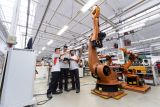The SEAT Apprentice School holds a virtual Open Doors Day event

This Wednesday, 20 May, the SEAT Apprentice School is ready to welcome the fresh talents who dream of becoming the future generation of automotive professionals, but with a novelty compared to previous years: the visit will be virtual instead of in-person, in order to comply with the measures adopted to ensure people’s health and safety. The visit will be streamed via the School’s website beginning at 7 pm.
David Calle, YouTube professor and the company’s Ambassador for Education and Youth Empowerment, will be the master of ceremonies of the virtual tour and will be in charge of welcoming the future students. Guided by the School’s head of studies and a number of teachers and apprentices, the virtual visitors will be able to see some of the centre’s most relevant facilities, such as the Kart Academy, the Smart factory laboratory, the augmented reality welding space, the robotics workshop, the 3D printing and numerical control rooms, among others, so that they can see for themselves what the students’ daily lives are like.
In addition, participants will be able to obtain information about the different Advanced Degree Vocational Training programmes adapted to the new needs arising from the transformation of industry and digitalisation, and about the process for registering for their training cycles. At the end of the virtual tour, David Calle and the rest of the teachers, students and SEAT managers participating in the event will be on hand to answer questions from future students.
The SEAT Apprentice School offers vocational training based on the German Dual Training system, lasting three years. The apprentices attend close to 5,000 classroom hours, double the average of other schools, which combine theoretical training with practical learning at the School itself, as well as at the SEAT Martorell, SEAT Barcelona or SEAT Componentes plants. In addition, these studies offer them a dual Spanish and German official qualification.
A candidate friendly selection process
Registration for this year’s term is open for three advanced degree training programs: Production Programming in Mechanical Manufacturing; Automation and Industrial Robotics; and Industrial Mechatronics. The registration period for applications is now open for those young people between 18 and 21 years of age who wish to apply for one of the 60 available slots.
Moreover, this year the process is digital, making the psycho-technical tests, face-to-face interviews and academic performance evaluation a candidate-friendly process with competence assessments by means of video interviews. Applications can be submitted until next June 5 and those selected will start the course in September. Since its inauguration in 1957, the SEAT Apprentice School has trained more than 2,700 students. Apprentices who successfully complete their training join SEAT with an open-ended contract.
“At SEAT we are committed to innovation to attract young talent. That is why we have made the selection process itself into a sample of what the trainees will find at the School: a centre that is fully adapted to the needs demanded by the automotive industry, where technology is at the core”, says Laura Carnicero, the head of Training at SEAT.
Furthermore, David Calle points out that “very often students ask me what to do when it’s time to decide what to study. I always tell them the same thing: the important thing is that it reflects your passion, what you like and what inspires your curiosity. And that’s exactly what I was thinking when I first visited the SEAT Apprentice School in Barcelona, a place that inspires.”
The Smart Factory, in the School
The automotive industry is adapting all its activity to take advantage of the options currently offered by technology. In order to be in line with this transformation and so that future professionals can thrive in the environment they will find when they enter the job market, the School has adapted both its facilities and its programmes over the last few years. The most recent infrastructure is a Smart Factory space, which was first put into use this year and simulates an interconnected smart factory. Here you can experience the operation of Industry 4.0 and learn how connectivity, communication among different elements and technologies, robots and data help to improve all processes.
Another example of programme innovation is the CodeLearn system, which teaches students different programming languages naturally and using gamification. Every day, students must solve a series of challenges in Phyton, Java or Unity languages. The training mechanism is simple, intuitive and encourages constant training in skills that will be key to their professional future.
Source of information
SEAT and ProfiBusiness.world
Date
May 18, 2020
Fotogalerie
Translator
News and information
Agriculture
Animals and pet supplies
Automotive
Banking and insurance
Boats and shipping industry
Building and architecture
Business
Education
Electrical industry
Electronics
Engineering
Environment
Finance, taxes and accounting
Flowers and plants
Food and beverage industry
For companies
Forestry and wood processing
Furniture
Gastronomy and hotel industry
Glass, ceramics and porcelain
Healthcare and pharmacy
Hobby and garden
Home and household goods
HR
Hygiene, drugstore and cosmetics
Charity and social responsibility
Chemical
Institution
IT and computers
Law and legislation
Management and certification systems
Minerals
Office
Packaging and packaging technologies
Paper industry
Plastic and rubber industry
Power engineering
PR and marketing
Printing and printing technology
Railway industry
Real estate
Safety, security and protection
Science and research
Social services
Sport and relax
Steel and iron processing
Telecommunications and the internet
Textile and leather industry
Tourism
Toys, games and entertainment
Transport and logistics






